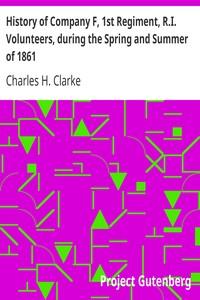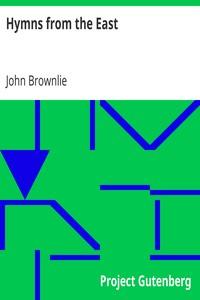Read this ebook for free! No credit card needed, absolutely nothing to pay.
Words: 6270 in 2 pages
This is an ebook sharing website. You can read the uploaded ebooks for free here. No credit cards needed, nothing to pay. If you want to own a digital copy of the ebook, or want to read offline with your favorite ebook-reader, then you can choose to buy and download the ebook.


: History of Company F 1st Regiment R.I. Volunteers during the Spring and Summer of 1861 by Clarke Charles H - United States History Civil War 1861-1865 Regimental histories; United States. Army. Rhode Island Infantry Regiment 1st (1861-1865). Company F; Rho
wever, lay down in our bush huts, expecting to remain until morning; but about midnight we were aroused and ordered to start on the road to Washington. The drizzle had not abated and the night was dark; we had been in a state of continued and unusual activity since 2 o'clock the previous morning, and in addition had been all day without food. Footsore and weary we started on our march of twenty-six miles to Washington, and soon after daylight, Monday, July 22d, reached Long Bridge, where we made a halt and rations were served to us, and at 8 A. M. we crossed over to Washington, and marched across the city to our old home at Camp Sprague. The roll was called, a ration of whiskey was given us, and all turned in for a much needed and well earned rest.
OPINIONS ON THE BATTLE.
Many opinions have been given as to the causes that led to the defeat of the Union army at Bull Run. General Sherman, who commanded a brigade in the battle, said it was the best planned and worst fought battle of the war. It has been said by some writers that the plans of the commanding general were not carried out, and that each of the three division commanders whose forces were actually engaged acted on their own responsibility and were governed by circumstances. It is a fact well known to-day, that the Union army, at or in the vicinity of the battle field, were in numbers quite sufficient to have at least held any and every position that a portion of the army had gained. On a map now in possession of Charles E. Lawton Post, G. A. R. of this city, of Bull Run battlefield, drawn under the direction of Generals McDowell and Beauregard, by order of the War Department, the position of every regiment and brigade of both armies at the commencement of the engagement is defined, and in a note appended to the map it is stated that the engagement was commenced by the Burnside brigade, and it is a historical fact recognized at this time, that the battle was fought and won by the Second Division, commanded by Burnside, General Hunter having been wounded before the troops had been brought into position, supported by no other troops, until noon, when a brigade of the Third Division, which had followed us through the forest road, came to our assistance. From 9.30 A. M. to 1 P. M., these seventeen regiments of infantry and four light batteries, unaided by any other troops, fought and drove the enemy from their position on Buck's Hill; and when the two brigades of Tyler's First Division, commanded by Generals Sherman and Schenck, crossed Bull Run river, over Stone Bridge, at 1.30 P. M., there was not a rebel force of any description on the north side of Warrenton road, west of Stone Bridge. At this time victory was assured for the Union army. At the Stone Bridge was Tyler's entire division, comprising fifteen regiments of infantry and three batteries, the Fourth Division, General Runyon, with seven regiments, Fifth Division, General Miles, eight regiments, and one battery. Of these thirteen thousand men, only two brigades of the First Division crossed the river in the afternoon, and they were engaged only about one hour, namely, in the vicinity of the Henry House, when they were repulsed by the enemy, whose forces were now all concentrated at that point. Rickett's Regular battery was lost, recaptured, and lost again. These two brigades of the First Division retreated, panic stricken, and our reserve of twelve thousand men, at Stone Bridge, retreated without firing a shot, while our Division, the 2d, was holding the position we had gained in the morning. This was the supreme moment, when a Sheridan or a Warren would have swept the opposing forces from the field, or captured their entire army. Colonel Burnside, seeing the aspect matters had assumed, formed his troops into line and fell back to the Warrenton road, fearing he might be cut off at Stone Bridge. Hunter's Division covered the retreat and were the last troops that crossed the bridge, and was the only Division of the army that occupied its former quarters, as these did, at Centreville that night.
DAY AFTER THE BATTLE.
The day after the battle was a busy one in camp; men were straggling in all day, some of them that we had left among the wounded at the field hospital on our departure the evening previous, who had managed to hobble along on the road, and after a while reached camp. Some of these, owing to the darkness of the night, had taken the wrong road from Fairfax and brought up at Alexandria, whence they set out anew, reaching Long Bridge and the camp some hours later. Among these latter was John Fludder, who did not arrive until Monday afternoon, when he surprised us by bringing with him the regimental flag, which we had supposed to have been lost when the regiment "straggled" at Stone Bridge, as no one could give any information in regard to it. Fludder found it where it had been dropped in the confusion of retreat, and in order to save it tore it from the staff and secreting it about his person, thus brought it in. Samuel Hilton, who had been left on the field for dead, also came straggling in; he had been hit in the temple by a partially spent fragment of a shell and laid out senseless and inanimate, and was afterwards revived by the drizzling rain, as were also quite a number belonging to other regiments.
Company F had its full share of losses in killed and wounded. The first man of the company wounded was John B. Landers, shot through the wrist; then followed John Rogers, shot in the leg, Charles Becherer, color sergeant, wounded in the shoulder, Albert N. Burdick, color corporal, wounded in the arm, John P. Peckham, shot in the head and killed, Andrew P. Bashford, shot in the breast and taken prisoner, Theodore W. King, shot through the groin, mortally wounded, taken prisoner, and afterwards died in Philadelphia, when on his way home, Thomas J. Harrington, shot in the head and killed, Allen Caswell, shot in the stomach, Henry T. Easton, wounded in the arm, Samuel Hilton, wounded as above stated, Bartlett L. Simmons, taken prisoner, Robert Crane, never accounted for, but supposed to have been killed during the retreat.
July 24th, Doctor David King and Alderman James C. Powell, of Newport, arrived in camp. Doctor King obtained a pass through the lines for the purpose of attending his son, wounded as above stated, and who was a prisoner in Richmond. Alderman Powell was deputed by the city government of Newport to look after the sick and wounded of Company F on their way home.
Orders were received, July 24th, to make preparations for return to Rhode Island, as our term of service had expired. Colonel Burnside offered the services of the regiment for a longer time, as it was expected that the rebels would make an attack on Washington; but it was thought our services would not be needed, and preparations for departure were accordingly made. On Thursday, July 25th, we had dress parade for the last time in Washington. After the parade, the 2d Regiment was formed in line directly opposite and facing us, and the men of the two regiments exchanged muskets, each with the man opposite him; the muskets of the Second were old, smooth bore, altered over, while those of the First were the latest improved Springfield rifles. During the evening, we improved the opportunity to visit the camp of the Second, bidding them good bye, and receiving such messages and tokens as they desired to send home to friends.
"HOME, SWEET HOME."--ARRIVAL.--FLAG PRESENTATION.
At 9 P. M., 25th, the command was given to "Fall in;" the line was formed, we marched into the city, and at midnight bid farewell to Washington, the cars taking us into Baltimore at daylight, where we waited on the streets all the forenoon for the special train that was to take us to Philadelphia. We got away from Baltimore at 2 P. M., arriving in Philadelphia in the evening. We had been expected, and were entertained by the citizens with a fine collation at the New England rooms.
We left that city at 2 A. M., July 27th, arriving in New York soon after daylight, where the regiment embarked on board steamers Bay State and State of Maine, for Providence. Each steamer took five companies, ours being on the State of Maine, on board of which we were given a nice breakfast. We steamed out of New York at about 11 A. M., July 27th, the transports proceeding slowly to avoid arriving in Providence at a late hour in the day. At 10.30 P. M. we were off Beaver Tail light; F Company was called and formed on the hurricane deck, Captain Tew arranging with the steamer captain to sail through the inner harbor of Newport. When opposite Fort Greene, a squad of the Newport Artillery fired a salute, which was answered with cheering by F Company, and the blowing of the steamer's whistle. Both steamers proceeded up the bay and anchored, it being the wish to not land before daylight.
At 6 A. M. Sunday, July 28th, landed, and, escorted by the militia of the state, marched through the city to Railroad Hall, Exchange Place, where a substantial breakfast awaited us. After breakfast and speeches by Bishop Clark and others, the regimental companies residing outside of Providence were ordered to their homes, to report again in Providence August 2d.
Free books android app tbrJar TBR JAR Read Free books online gutenberg
More posts by @FreeBooks

: Hymns from the East Being Centos and Suggestions from the Office Books of the Holy Eastern Church by Brownlie John - Hymns Greek Translations into English; Orthodox Eastern Church Hymns Christianity


: Notes and Queries Number 196 July 30 1853 A Medium of Inter-communication for Literary Men Artists Antiquaries Genealogists etc. by Various Bell George Editor - Questions and answers Periodicals Notes and Queries





